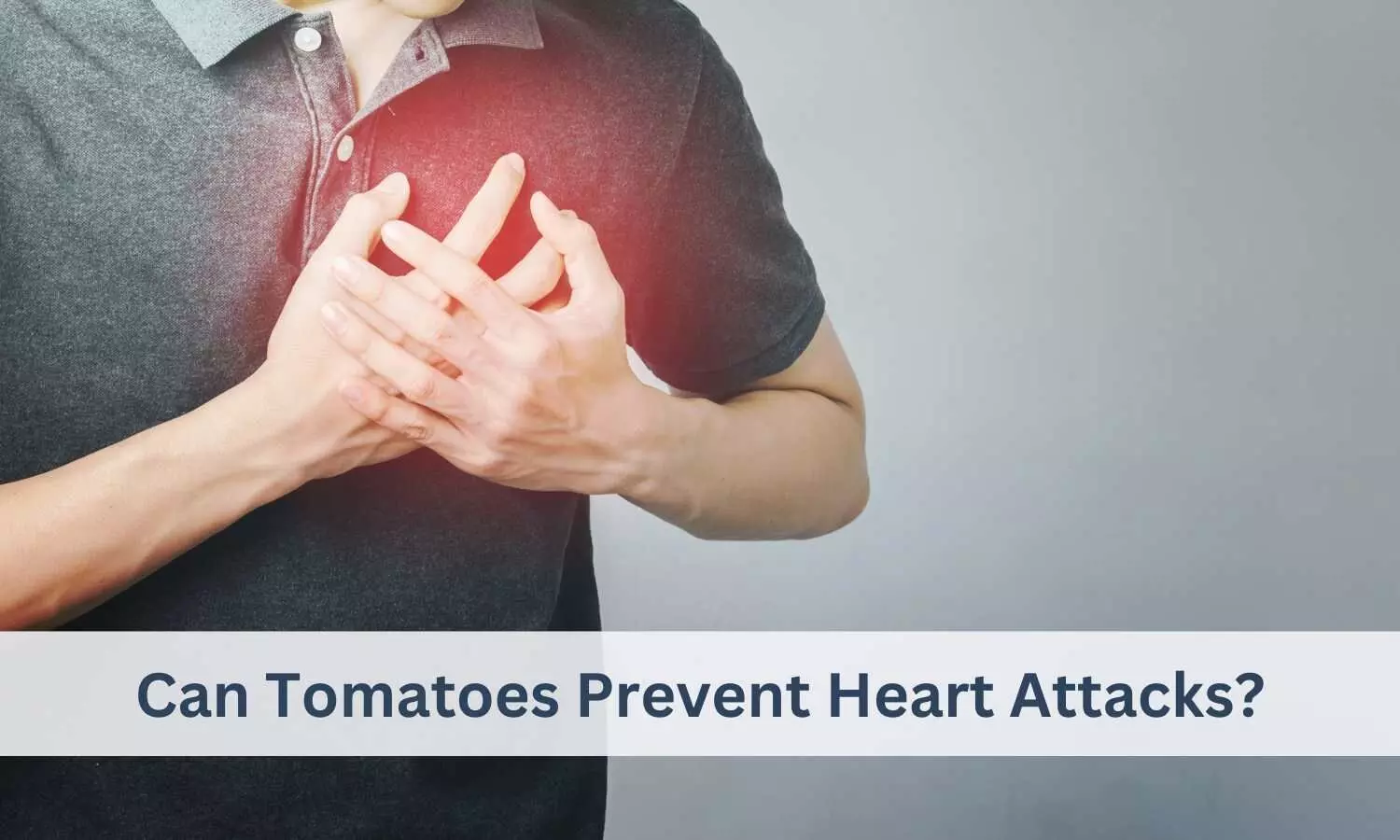Fact Check: Can Tomatoes Prevent Heart Attacks?

Claim: In an Instagram post, the user claims that eating tomatoes prevents heart attacks. The user says that tomatoes are bright red fruits with lycopene that are rich in antioxidants. These antioxidants lower the risk of heart disease, reduce inflammation, and prevent plaque from building up in arteries. The claim can be seen here.
Fact Check: This claim is MISLEADING.
Incidence of heart attacks (myocardial infarction) in India
Heart attacks, or myocardial infarctions (MI), are a major health concern in India. Recent data from the National Crime Records Bureau (NCRB) indicates a significant 12.5% rise in heart attack cases in 2022, with 32,457 deaths, up from 28,413 the previous year (6).
In India, nearly one-fourth of the deaths among adults are due to heart attack and stroke, according to the Indian Council of Medical Research (ICMR). (7) This increase in heart attack fatalities is partly linked to lifestyle changes and reduced physical activity during the COVID-19 pandemic. Contributing factors include a poor diet, smoking, high stress levels, lack of exercise, and genetic predisposition.
Understanding Heart Attacks or Myocardial Infarction (MI)
As per the National Heart, Lung and Blood Institute (NHLBI), “A heart attack, also known as a myocardial infarction, happens when the flow of blood that brings oxygen to a part of your heart muscle suddenly becomes blocked and the heart can’t get enough oxygen. If blood flow is not restored quickly, the heart muscle will begin to die.” (1)
Risk Factors Associated with Heart Attacks
Several lifestyle and health factors influence heart attack risk. An unhealthy diet high in saturated fats or sodium, lack of regular physical activity, and smoking are significant contributors. Medical conditions like high cholesterol, high blood pressure (including during pregnancy), high blood sugar or diabetes, high triglycerides, and obesity also increase the risk. When three or more of these conditions occur together, it is called metabolic syndrome, which significantly raises the risk of a heart attack. Uncontrollable factors include age (with increased risk for men over 45 and women over 55 or after menopause), family history of early heart disease, and infections from bacteria and viruses. (1)
What are the symptoms of a heart attack, and what should you do?
Dr Manav Aggarwal, Interventional Cardiologist at Sanjeevan Hospital, New Delhi, explained, "A heart attack, or myocardial infarction, often comes with chest pain or discomfort that feels like pressure or squeezing. This pain might spread to the arms, back, neck, jaw, or stomach. Other signs include shortness of breath, cold sweats, nausea, vomiting, and dizziness. If you suspect someone is having a heart attack, call an ambulance immediately or take the patient to the hospital. Keep the person calm and seated or lying down. If you're trained, perform CPR if they lose consciousness or stop breathing. Offer aspirin if they aren’t allergic, and stay with them, providing reassurance and support until help arrives. Quick action can save lives, so don't hesitate to seek help right away."
What are the benefits of eating tomatoes?
Tomatoes are rich in dietary nutrients such as fibre, vitamins, minerals, protein, essential fatty acids, phytosterols, and carotenoids. They offer numerous health benefits, including antioxidant, antiproliferative, antidiabetic, and anti-inflammatory properties. Lycopene and β-carotene, two key compounds in tomatoes, possess potent antioxidant effects that are associated with reducing the risk of cancer and heart diseases. (2)
Lycopene is a naturally occurring carotenoid that gives red and pink fruits, such as tomatoes, watermelons, and pink grapefruits, their colour. It has high antioxidant potential, the highest among carotenoid pigments. Mainly for this reason, epidemiological studies show a number of favourable properties between the consumption of lycopene in the diet and a reduced risk of cardiovascular disease. (5)
Can Tomatoes Prevent Heart Attacks?
In a study published by Joye K Willcox et al. in Critical Reviews in Food Science and Nutrition, it is discussed that diet plays a significant role in the development of cardiovascular disease, the leading cause of death in the world. Tomatoes are rich in lycopene, beta-carotene, folate, potassium, vitamin C, flavonoids, and vitamin E. These nutrients can protect lipoproteins and vascular cells from oxidation and reduce LDL cholesterol, homocysteine, platelet aggregation, and blood pressure. Processing methods like homogenization and heat treatment can increase lycopene bioavailability while sometimes reducing other nutrients. Thus, tomatoes, with their array of nutrients and cardioprotective functions, are considered a valuable component of a heart-healthy diet. (4)
A meta-analysis and systematic review conducted by Cheng et al. included 32 studies in humans to examine the relationship between plasma levels of lycopene and the risk of cardiovascular disease (CVD). These studies confirmed a significant reduction in systolic blood pressure (up to 5.66 mmHg) after lycopene supplementation. Furthermore, individuals with the highest plasma lycopene concentrations had a 26% lower risk of suffering a myocardial infarction and a 37% lower risk of CVD mortality. (3)
Another umbrella review was conducted by Li et al. to systematically evaluate the overall evidence on the health outcomes related to tomato and lycopene intake. The review found that higher tomato intake is inversely associated with coronary heart disease mortality and cardiovascular disease (CVD). Despite the positive associations found, the quality of the evidence was not high. (8)
While there is some evidence supporting the cardiovascular benefits of tomato products and lycopene, particularly in reducing blood pressure and improving lipid profiles, the overall evidence is insufficient to make definitive health claims.
What do experts say?
Dr Prem Aggarwal, Cardiologist and Chairman of Sanjeevan Hospital, New Delhi, said, "Heart attacks, or myocardial infarctions, are a leading cause of death globally. While tomatoes are packed with beneficial nutrients like lycopene, beta-carotene, and vitamin C that support heart health, more research is needed to establish a direct link between tomato consumption and the prevention of heart attacks. Tomatoes can certainly be a valuable part of a heart-healthy diet, but relying on dietary changes to prevent heart attacks is insufficient. It's crucial to combine a balanced diet with regular exercise, medication if needed, and other lifestyle adjustments for comprehensive heart disease prevention."
Medical Dialogues Final Take
The claim that eating tomatoes can prevent heart attacks is misleading. While tomatoes are packed with nutrients like lycopene, beta-carotene, and vitamin C, which are beneficial for heart health, there is no scientific evidence or medical consensus to support the idea that consuming tomatoes can prevent heart attacks. Tomatoes can be a healthy addition to your diet, but preventing heart attacks requires more than just dietary changes. A balanced approach that includes regular exercise, medical management, and a healthy lifestyle is essential for effective heart disease prevention. More rigorous, well-designed clinical trials are needed to clarify the potential health benefits and establish a clear cause-effect relationship.
Hence, this claim is MISLEADING.
References
1. https://www.nhlbi.nih.gov/health/heart-attack
2. Ali MY, Sina AA, Khandker SS, Neesa L, Tanvir EM, Kabir A, Khalil MI, Gan SH. Nutritional Composition and Bioactive Compounds in Tomatoes and Their Impact on Human Health and Disease: A Review. Foods. 2020 Dec 26;10(1):45. doi: 10.3390/foods10010045. PMID: 33375293; PMCID: PMC7823427.
3. Cheng HM, Koutsidis G, Lodge JK, Ashor A, Siervo M, Lara J. Tomato and lycopene supplementation and cardiovascular risk factors: A systematic review and meta-analysis. Atherosclerosis. 2017 Feb;257:100-108. doi: 10.1016/j.atherosclerosis.2017.01.009. Epub 2017 Jan 13. PMID: 28129549.
4. Willcox, J. K., Catignani, G. L., & Lazarus, S. (2003). Tomatoes and cardiovascular health. Critical reviews in food science and nutrition, 43(1), 1–18. https://doi.org/10.1080/10408690390826437
5. Przybylska, S., & Tokarczyk, G. (2022). Lycopene in the Prevention of Cardiovascular Diseases. International journal of molecular sciences, 23(4), 1957. https://doi.org/10.3390/ijms23041957
6. https://ncrb.gov.in/uploads/nationalcrimerecordsbureau/custom/1701607577CrimeinIndia2022Book1.pdf
7. https://www.icmr.gov.in/pdf/press_realease_files/Newsletter_English_May_2022.pdf
8. Li N, Wu X, Zhuang W, Xia L, Chen Y, Wu C, et al. Tomato and lycopene and multiple health outcomes: umbrella review. Food Chem. (2021) 343:128396. doi: 10.1016/j.foodchem.2020.128396



